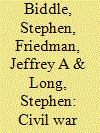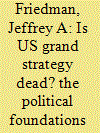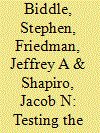|
|
|
Sort Order |
|
|
|
Items / Page
|
|
|
|
|
|
|
| Srl | Item |
| 1 |
ID:
116172


|
|
|
|
|
| Publication |
2012.
|
| Summary/Abstract |
This article addresses the challenge of managing uncertainty when producing estimative intelligence. Much of the theory and practice of estimative intelligence aims to eliminate or reduce uncertainty, but this is often impossible or infeasible. This article instead argues that the goal of estimative intelligence should be to assess uncertainty. By drawing on a body of nearly 400 declassified National Intelligence Estimates as well as prominent texts on analytic tradecraft, this article argues that current tradecraft methods attempt to eliminate uncertainty in ways that can impede the accuracy, clarity, and utility of estimative intelligence. By contrast, a focus on assessing uncertainty suggests solutions to these problems and provides a promising analytic framework for thinking about estimative intelligence in general.
|
|
|
|
|
|
|
|
|
|
|
|
|
|
|
|
| 2 |
ID:
156713


|
|
|
|
|
| Summary/Abstract |
National security is one of many fields where experts make vague probability assessments when evaluating high-stakes decisions. This practice has always been controversial, and it is often justified on the grounds that making probability assessments too precise could bias analysts or decision makers. Yet these claims have rarely been submitted to rigorous testing. In this paper, we specify behavioral concerns about probabilistic precision into falsifiable hypotheses which we evaluate through survey experiments involving national security professionals. Contrary to conventional wisdom, we find that decision makers responding to quantitative probability assessments are less willing to support risky actions and more receptive to gathering additional information. Yet we also find that when respondents estimate probabilities themselves, quantification magnifies overconfidence, particularly among low-performing assessors. These results hone wide-ranging concerns about probabilistic precision into a specific and previously undocumented bias that training may be able to correct.
|
|
|
|
|
|
|
|
|
|
|
|
|
|
|
|
| 3 |
ID:
111742


|
|
|
|
|
| Publication |
2012.
|
| Summary/Abstract |
Outside intervention in civil warfare is important for humanitarian, theoretical, and practical policy reasons-since 2006, much of the debate over the war in Iraq has turned on the danger of external intervention if the United States were to withdraw. Yet, the literature on intervention has been compartmented in ways that have made it theoretically incomplete and unsuitable as a guide to policy. We therefore integrate and expand upon the theoretical and empirical work on intervention and apply the results to the policy debate over the US presence in Iraq using a Monte Carlo simulation to build upon the dyadic results of probit analysis. We find that Iraq is, in fact, a significantly intervention-prone conflict in an empirical context; the prospect of a wider, regional war in the event that violence returns in the aftermath of US withdrawal cannot safely be ignored.
|
|
|
|
|
|
|
|
|
|
|
|
|
|
|
|
| 4 |
ID:
137054


|
|
|
|
|
| Summary/Abstract |
In a series of reports and meetings in Spring 2011, intelligence analysts and officials debated the chances that Osama bin Laden was living in Abbottabad, Pakistan. Estimates ranged from a low of 30 or 40 per cent to a high of 95 per cent. President Obama stated that he found this discussion confusing, even misleading. Motivated by that experience, and by broader debates about intelligence analysis, this article examines the conceptual foundations of expressing and interpreting estimative probability. It explains why a range of probabilities can always be condensed into a single point estimate that is clearer (but logically no different) than standard intelligence reporting, and why assessments of confidence are most useful when they indicate the extent to which estimative probabilities might shift in response to newly gathered information.
|
|
|
|
|
|
|
|
|
|
|
|
|
|
|
|
| 5 |
ID:
186992


|
|
|
|
|
| Summary/Abstract |
International Relations scholars frequently warn that the American political system has become too fractured to sustain a coherent grand strategy. This perception generally rests on two premises: that President Donald Trump led an unprecedented assault on established principles of US foreign policy, and that Democrats and Republicans have become so polarized that they can no longer agree on a common vision for global leadership. By contrast, this article argues that the grand strategy of deep engagement retains robust bipartisan support. Even though President Trump rejected more expansive conceptions of liberal internationalism, his behaviour was largely consistent with deep engagement's principles. Moreover, when Trump departed from deep engagement—as with questioning the US commitment to NATO—his actions did not reflect voters' policy preferences. In fact, polling data indicate that public support for deep engagement is at least as strong today as it has been at any other point since the end of the Cold War. Altogether, the article thus demonstrates that the grand strategy of deep engagement is less embattled, and more politically viable, than the conventional wisdom suggests.
|
|
|
|
|
|
|
|
|
|
|
|
|
|
|
|
| 6 |
ID:
109071


|
|
|
|
|
| Publication |
2011.
|
| Summary/Abstract |
How does manpower affect counterinsurgency? Important debates about counterinsurgency theory, military doctrine, force planning, and ongoing military operations revolve around assumptions about the role manpower plays in determining counterinsurgency outcomes. But these assumptions have not, by and large, been subjected to large-n analysis. This paper helps serve that role by examining new data on counterinsurgents' deployments across 171 campaigns since World War I. These data provide insight into a range of important issues, such as how force size should be measured, whether it is related to counterinsurgent success, whether troop nationality matters, and whether the role of manpower varies across contexts. Of these findings, the most notable is that conventional rules of thumb for force sizing, including the recommendation put forth in official US military doctrine, receive no empirical support. These findings therefore challenge the prevailing wisdom, while laying the groundwork for a range of future scholarship.
|
|
|
|
|
|
|
|
|
|
|
|
|
|
|
|
| 7 |
ID:
113673


|
|
|
|
|
| Publication |
2012.
|
| Summary/Abstract |
Why did violence decline in Iraq in 2007? Many policymakers and scholars credit the "surge," or the program of U.S. reinforcements and doctrinal changes that began in January 2007. Others cite the voluntary insurgent stand-downs of the Sunni Awakening or say that the violence had simply run its course with the end of a wave of sectarian cleansing; still others credit an interaction between the surge and the Awakening. The difference matters for policy and scholarship, yet this debate has not moved from hypothesis to test. An assessment of the competing claims based on recently declassified data on violence at local levels and information gathered from seventy structured interviews with coalition participants finds little support for the cleansing or Awakening theses. Instead, a synergistic interaction between the surge and the Awakening was required for violence to drop as quickly and widely as it did: both were necessary; neither was sufficient. U.S. policy thus played an important role in reducing the violence in Iraq in 2007, but Iraq provides no evidence that similar methods will produce similar results elsewhere without local equivalents of the Sunni Awakening.
|
|
|
|
|
|
|
|
|
|
|
|
|
|
|
|
| 8 |
ID:
141706


|
|
|
|
|
| Summary/Abstract |
Casualty counts are often controversial, and thorough research can only go so far in resolving such debates—there will almost always be missing data, and thus, a need to draw inferences about how comprehensively violence has been recorded. This article addresses that challenge by developing an estimation strategy based on the observation that violent events are generally distributed according to power laws, a pattern that structures expectations about what event data on armed conflict would look like if those data were complete. This technique is applied to estimate the number of Native American and US casualties in the American Indian Wars between 1776 and 1890, demonstrating how scholars can use power laws to estimate conflict size, even (and perhaps especially) where previous literature has been unable to do so.
|
|
|
|
|
|
|
|
|
|
|
|
|
|
|
|
| 9 |
ID:
160578


|
|
|
|
|
| Summary/Abstract |
Scholars, practitioners, and pundits often leave their assessments of uncertainty vague when debating foreign policy, arguing that clearer probability estimates would provide arbitrary detail instead of useful insight. We provide the first systematic test of this claim using a data set containing 888,328 geopolitical forecasts. We find that coarsening numeric probability assessments in a manner consistent with common qualitative expressions—including expressions currently recommended for use by intelligence analysts—consistently sacrifices predictive accuracy. This finding does not depend on extreme probability estimates, short time horizons, particular scoring rules, or individual attributes that are difficult to cultivate. At a practical level, our analysis indicates that it would be possible to make foreign policy discourse more informative by supplementing natural language-based descriptions of uncertainty with quantitative probability estimates. More broadly, our findings advance long-standing debates over the nature and limits of subjective judgment when assessing social phenomena, showing how explicit probability assessments are empirically justifiable even in domains as complex as world politics.
|
|
|
|
|
|
|
|
|
|
|
|
|
|
|
|
| 10 |
ID:
143756


|
|
|
|
|
| Summary/Abstract |
The US Intelligence Community (IC) has been heavily criticized for making inaccurate estimates. Many scholars and officials believe that these criticisms reflect inappropriate generalizations from a handful of cases, thus producing undue cynicism about the IC's capabilities. Yet there is currently no way to evaluate this claim, because the IC does not systematically assess the accuracy of its estimates. Many scholars and practitioners justify this state of affairs by claiming that assessing estimative accuracy would be impossible, unwise, or both. This article shows how those arguments are generally unfounded. Assessing estimative accuracy is feasible and desirable. This would not require altering existing tradecraft and it would address several political and institutional problems that the IC faces today.
|
|
|
|
|
|
|
|
|
|
|
|
|
|
|
|
|
|
|
|
|